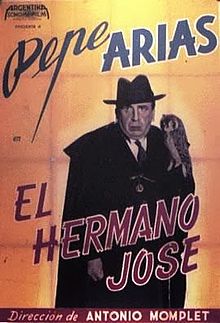This article needs additional citations for
verification. (March 2017) |
| El Hermano José | |
|---|---|
 | |
| Directed by | Antonio Momplet |
| Written by | Nicolás Proserpio |
| Starring |
Pepe Arias Carlos Castro Ada Cornaro María Duval |
| Cinematography | Antonio Merayo |
| Edited by | Nicolás Proserpio |
Production company | |
Release date |
|
| Country | Argentina |
| Language | Spanish |
Brother Joe (Spanish: El Hermano José) is a 1941 Argentine comedy film.
Production
The 93-minute black and white film was made for Argentina Sono Film by director Antonio Momplet. It was written by Nicolás Proserpio, and stars Pepe Arias, Carlos Castro and Ada Cornaro.
Synopsis
The movie deals with the interaction in a small town between a healer, his daughter and a young doctor, between science and superstition.
Reception
La Nación called the film a popular and satirical comedy. Halki noted that it was a visual version of a successful radio show. Manrupe and Portela and said it was a classic Pepe Arias work, with everything good and bad that implies, and had been filmed without much effort. [1]
Full cast
The full cast was:
- Pepe Arias
- Carlos Castro
- Ada Cornaro
- Dario Cossier
- María Duval
- Isabel Figlioli
- Ramón Garay
- Antonio Gianelli
- José Otal
- Raimundo Pastore
- Ernesto Raquén
- José Ruzzo
- Semillita
- Ernesto Villegas
References
Citations
- ^ Manrupe & Portela 2001, p. 271.
Sources
- Manrupe, Raúl; Portela, María Alejandra (2001). Un diccionario de films argentinos (1930-1995) (in Spanish). Buenos Aires: Corregidor. ISBN 950-05-0896-6.
External links
- Brother Joe at IMDb
This article needs additional citations for
verification. (March 2017) |
| El Hermano José | |
|---|---|
 | |
| Directed by | Antonio Momplet |
| Written by | Nicolás Proserpio |
| Starring |
Pepe Arias Carlos Castro Ada Cornaro María Duval |
| Cinematography | Antonio Merayo |
| Edited by | Nicolás Proserpio |
Production company | |
Release date |
|
| Country | Argentina |
| Language | Spanish |
Brother Joe (Spanish: El Hermano José) is a 1941 Argentine comedy film.
Production
The 93-minute black and white film was made for Argentina Sono Film by director Antonio Momplet. It was written by Nicolás Proserpio, and stars Pepe Arias, Carlos Castro and Ada Cornaro.
Synopsis
The movie deals with the interaction in a small town between a healer, his daughter and a young doctor, between science and superstition.
Reception
La Nación called the film a popular and satirical comedy. Halki noted that it was a visual version of a successful radio show. Manrupe and Portela and said it was a classic Pepe Arias work, with everything good and bad that implies, and had been filmed without much effort. [1]
Full cast
The full cast was:
- Pepe Arias
- Carlos Castro
- Ada Cornaro
- Dario Cossier
- María Duval
- Isabel Figlioli
- Ramón Garay
- Antonio Gianelli
- José Otal
- Raimundo Pastore
- Ernesto Raquén
- José Ruzzo
- Semillita
- Ernesto Villegas
References
Citations
- ^ Manrupe & Portela 2001, p. 271.
Sources
- Manrupe, Raúl; Portela, María Alejandra (2001). Un diccionario de films argentinos (1930-1995) (in Spanish). Buenos Aires: Corregidor. ISBN 950-05-0896-6.
External links
- Brother Joe at IMDb